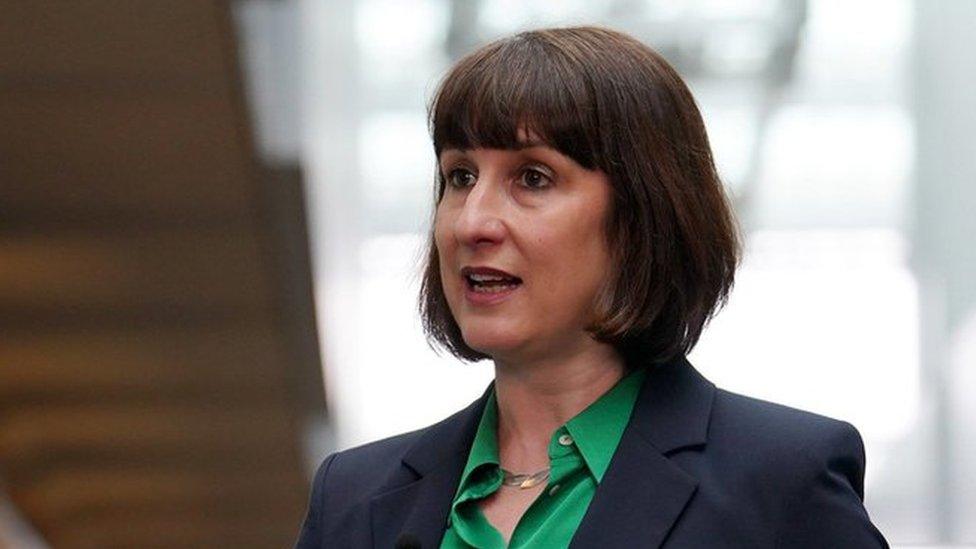Rachel Reeves: Government gaslighting people over state of economy
- Published
- comments
Watch: Shadow chancellor claims abolishing National Insurance is a "tax bombshell aimed at British pensioners"
The government is "gaslighting" Britain over the state of the economy and its plans are "deluded", shadow chancellor Rachel Reeves has said.
Key economic figures this week are likely to show the UK emerging from recession, while the Bank of England could take steps towards interest rate cuts.
The economy is likely to be a key battleground in the upcoming general election.
The Tories said Labour had "no plan".
Giving a speech in the City of London, Ms Reeves said that suggestions the feel-good factor is returning are "completely out of touch with the realities on the ground".
On Friday, however, the first official data on gross domestic product in the three months to March is likely to show that the economy grew, marking the official end to a shallow recession last year.
The Bank of England could take further steps towards interest rate cuts on Thursday too, ahead of a likely sharp fall in inflation - which measures how prices rise over time - later in the month.
While Ms Reeves acknowledged "these things could happen this month", the opposition's intervention is designed to pre-empt the government's argument about the cost-of-living crisis being over and the coming general election being about "protecting the recovery".
"The Conservatives are gaslighting the British public," she said.
"Gaslighting" is psychologically manipulating a person into questioning his or her perception of reality.
At the beginning of 2023, Rishi Sunak set out the Conservatives' priorities, including halving inflation, growing the economy, and reducing government debt.
The government has met the first pledge, and never set out what it meant by growing the economy. Debt remains at levels last seen during the early 1960s.
Just days after a difficult set of local and mayoral elections for the Conservatives, Ms Reeves announced that Labour hopes to fight the general election "on the economy", saying that voters could choose "five more years of chaos with the Conservatives" or "stability with a changed Labour Party".
In response, chairman of the Conservative Party, Richard Holden MP, said: "The personnel may change but the Labour Party hasn't."
He said that the Labour Party has "no plan" and would take the British public "back to square one" with higher taxes and higher unemployment rates.
Despite abandoning its long-standing plan to borrow and spend £28bn of public money on new, green industries, Mr Reeves restated Labour's commitment to a new vision for a green economy, reflecting thinking in the US and Europe.
In February Labour rowed back on plans to spend £28bn a year on environmental projects if it wins the upcoming general election.
Responding to a question from the BBC on Tuesday, Ms Reeves said that getting to clean energy by 2030 and creating green jobs can be done "through other means", including the creation of GB Energy, the National Wealth Fund, and planning reforms.
Ms Reeves said that investment in low-carbon industries was being held back by the UK planning system.
Last month, her National Wealth Fund "taskforce", including former Bank of England Governor Mark Carney, and the chief executives of Barclays and Aviva, met to discuss how to raise £22bn in private sector investment in next generation technologies.
It is expected to report back before the summer.
Related topics
- Published2 May 2024
- Published9 April 2024
